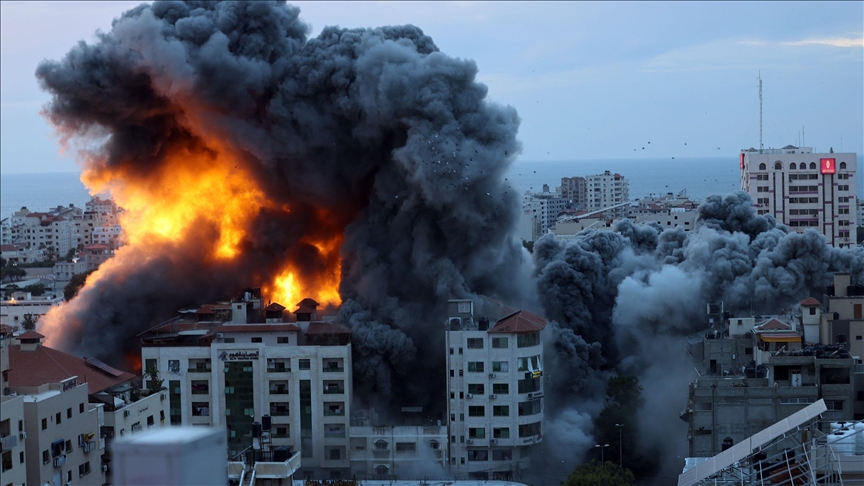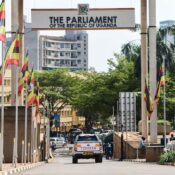
Israel goes after the Hezbollah intelligence office in Lebanon, and Iran says it won’t back down
Overnight, Israel said it attacked the intelligence offices of Hezbollah in Lebanon. On Friday, after a series of strikes on top Hezbollah figures that Iran’s Supreme Leader said were pointless, Israel was assessing the damage.
It was said that the airstrike on Beirut, which was part of a wider attack that forced more than 1.2 million Lebanese to leave their houses, was aimed at the possible successor to the Hezbollah leader who was killed by Israel a week ago.
It was not clear what happened to Hashem Safieddine, and neither Israel nor Hezbollah have said anything.
Ayatollah Ali Khamenei, the leader of Iran, told a huge crowd in Tehran that Iran and its friends in the region would not back down. This came just two days after Tehran raised the stakes by firing missiles at Israel, which this week sent troops into Lebanon.
The Israeli military has said that its operations on the ground are “localized” in villages close to the border. However, it has not said how far into Lebanon its troops will go or how long the operation is expected to last.
Israel killed Sayyed Hassan Nasrallah, the powerful leader of Hezbollah who turned the group into a strong military and political force with influence across the Middle East. This was one reason why Iran fired a bunch of missiles at Israel.
Israel has promised to react, and oil prices have gone up because of the chance of an attack on Iran’s oil facilities. This is because Israel wants to get rid of Hezbollah militants in Lebanon and their allies in Gaza, Hamas.
“The resistance in the region will not back down even if its leaders are killed,” Khamenei said in a rare appearance to lead Friday prayers in Tehran. He talked about Nasrallah and said that Iran’s attack on Israel was legal and right.
He said that Iran will not “delay nor act hastily to carry out its duty” when it comes to dealing with Israel. He did not make a direct new threat to Israel or the US, but he did grab the barrel of a rifle that was standing to his left.
Ali Fadavi, deputy commander of the Revolutionary Guards, told the semi-official Iranian news service SNN on Friday that if Israel attacked, Tehran would attack Israeli gas and energy facilities.
Three Israeli sources told Barak Ravid of Axios that Safieddine, a Hezbollah official who was rumored to be Nasrallah’s replacement, had been attacked in an underground bunker in Beirut overnight, but it wasn’t clear what happened to him.
According to Israeli Lieutenant Colonel Nadav Shoshani, the military was still figuring out how bad the damage was from Thursday night’s airstrikes in southern Beirut, which were meant to hit Hezbollah’s intelligence offices. This was said on Friday afternoon.
The Israeli military said earlier that Mohammad Rashid Sakafi, who was in charge of Hezbollah’s information networks, had been killed. It wouldn’t say anything about the claim that Safieddine was targeted.
Hezbollah didn’t say anything about what happened to Sakafi or Safieddine. However, Sayyed Abdallah Safieddine, who is Hezbollah’s agent in Iran, went to Khamenei’s speech in Tehran.
Khamenei said that killing people would only lead to more strikes.
“Every strike launched by any group against Israel is a service to the region and to all humanity,” he added.
LESS THICK BUILDINGS IN BEIRUT
Strikes that have been going on for a week have destroyed many houses in Hezbollah’s stronghold in the southern suburbs of Beirut. Moawad Souk is a major market street where most of the storefronts were broken, and the street was full of broken glass.
He said, “We’re alive, but we don’t know for how long.” Nouhad Chaib, 40, had already left his home in the south.
More and more, Israeli attacks have been aimed at hospitals and aid workers. The Lebanese health ministry said that nine people were killed when an attack late Wednesday night hit a building in central Beirut that was used by rescue workers with ties to Hezbollah.
One strike on Friday killed a rescue worker from the same unit in the southern suburbs of Beirut. Another hit the southern Lebanese town of Marjayoun near its main hospital. The hospital director, Mounes Klakesh, told Reuters that the medical staff has chosen to leave for the time being.
Israel says that the terrorists are hiding among civilians, but Hezbollah says that is not true.
Abbas Araqchi, Iran’s foreign minister, was in Beirut on Friday and said that the fact that he was there “in these difficult circumstances” was the best proof that Iran stood by Hezbollah and Lebanon.
He met with top Lebanese leaders, such as Najib Mikati, who is caretaker prime minister, and Nabih Berri, who is speaker of parliament and a supporter of Hezbollah.
Araqchi said that Tehran was in favor of work toward a ceasefire in Lebanon as long as it was backed by Hezbollah and happened at the same time as a truce in the Gaza Strip.
The attack by Hamas on southern Israel on October 7 shocked the whole country and led to a war against the group. Along with Hezbollah, the Houthis in Yemen, and armed groups in Iraq, Iran’s “Axis of Resistance” supporters have attacked the area to help the Palestinians in Gaza. Khamenei said that Afghanistan should help with the “defense.”
FACILITIES FOR OIL
Thursday, U.S. President Joe Biden said that Israel might attack Iran’s oil facilities as a reaction to Iran’s missile attack, which Israel repelled.
His words caused a rise in oil prices around the world as traders worry about possible supply problems.
Israel says its actions in Lebanon are meant to let tens of thousands of its own people go back home after being forced to leave the north of the country by Hezbollah bombings during the Gaza war.
The government of Lebanon says that Israel has attacked Lebanon a lot in the past year, killing almost 2,000 people. Most of these deaths have happened in the last two weeks.
The United Nations said that most of Lebanon’s nearly 900 shelters were full and that more and more people were sleeping in the streets or public parks.
An Israeli airstrike early Friday morning made a 4.4-yard-wide crater near Lebanon’s main border crossing with Syria. This made it impossible for cars full of people leaving Lebanon to get through.
When Hezbollah brings weapons into Lebanon, the Israeli military says, they use the crossing. The government of Lebanon says that cars are checked and that the crossing is very important for humanitarian reasons.
On Friday, people were seen walking around the hole with bags and gas tanks full about to cross into Syria.
After two weeks of heavy bombings, Israel started doing things on the ground in southern Lebanon this week. They were pushed back by Hezbollah with ambushes, rockets, and direct battles.
All Categories
Recent Posts
Tags
+13162306000
zoneyetu@yahoo.com



